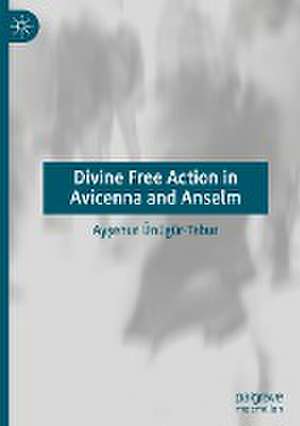Divine Free Action in Avicenna and Anselm
Autor Ayşenur Ünügür-Taburen Limba Engleză Hardback – 20 sep 2023
The book has three main objectives: (1) to thoroughly analyse both philosophers’ views on DDS, divine free will, and their compatibility; (2) to put them into the context of the contemporary discourse of the philosophy of religion, by investigating whether it is possible to have freedom without the ability to do otherwise (as proposed by both philosophers for divine free will) with a reference to the prominent contemporary discussions initiated by Harry Frankfurt’s counterexamples; and (3) to show the plausibility of the agent-causal view for divine freedom (as defended by Anselm and Avicenna) by briefly sketching an alternative account based on Anselmian intuitions (the meta-awareness account) which can avoid the reasons-explanation objection and the luck objection against thelibertarian agent-causal view.
Preț: 685.59 lei
Preț vechi: 806.57 lei
-15% Nou
Puncte Express: 1028
Preț estimativ în valută:
131.25€ • 134.98$ • 108.88£
131.25€ • 134.98$ • 108.88£
Carte tipărită la comandă
Livrare economică 18 februarie-04 martie
Preluare comenzi: 021 569.72.76
Specificații
ISBN-13: 9783031401602
ISBN-10: 3031401603
Pagini: 225
Ilustrații: VIII, 225 p.
Dimensiuni: 148 x 210 mm
Greutate: 0.43 kg
Ediția:1st ed. 2023
Editura: Springer Nature Switzerland
Colecția Palgrave Macmillan
Locul publicării:Cham, Switzerland
ISBN-10: 3031401603
Pagini: 225
Ilustrații: VIII, 225 p.
Dimensiuni: 148 x 210 mm
Greutate: 0.43 kg
Ediția:1st ed. 2023
Editura: Springer Nature Switzerland
Colecția Palgrave Macmillan
Locul publicării:Cham, Switzerland
Cuprins
Chapter 1: Introduction.- Chapter 2: Avicenna and Anselm on God and Divine Simplicity.- Chapter 3: Avicenna’s Account of Free Will and Divine Freedom.- Chapter 4: Anselm’s Account of Free Will and Divine Freedom.- Chapter 5: Divine Simplicity and Divine Freedom.- Chapter 6: Divine Freedom, Agent-Causal Power, and Reasons-Explanation.- Chapter 7: Conclusion.
Notă biografică
Ayşenur Ünügür-Tabur is a Postdoctoral Researcher at Augsburg University, Germany.
Textul de pe ultima copertă
This book investigates the compatibility between the doctrine of divine simplicity (DDS, hereafter) and divine free action primarily in the works of Avicenna and Anselm with an analytical approach.
The book has three main objectives: (1) to thoroughly analyse both philosophers’ views on DDS, divine free will, and their compatibility; (2) to put them into the context of the contemporary discourse of the philosophy of religion, by investigating whether it is possible to have freedom without the ability to do otherwise (as proposed by both philosophers for divine free will) with a reference to the prominent contemporary discussions initiated by Harry Frankfurt’s counterexamples; and (3) to show the plausibility of the agent-causal view for divine freedom (as defended by Anselm and Avicenna) by briefly sketching an alternative account based on Anselmian intuitions (the meta-awareness account) which can avoid the reasons-explanation objection and the luck objection againstthe libertarian agent-causal view.
Ayşenur Ünügür-Tabur is a Postdoctoral Researcher at Augsburg University, Germany.
The book has three main objectives: (1) to thoroughly analyse both philosophers’ views on DDS, divine free will, and their compatibility; (2) to put them into the context of the contemporary discourse of the philosophy of religion, by investigating whether it is possible to have freedom without the ability to do otherwise (as proposed by both philosophers for divine free will) with a reference to the prominent contemporary discussions initiated by Harry Frankfurt’s counterexamples; and (3) to show the plausibility of the agent-causal view for divine freedom (as defended by Anselm and Avicenna) by briefly sketching an alternative account based on Anselmian intuitions (the meta-awareness account) which can avoid the reasons-explanation objection and the luck objection againstthe libertarian agent-causal view.
Ayşenur Ünügür-Tabur is a Postdoctoral Researcher at Augsburg University, Germany.
Caracteristici
Analyses divine simplicity and freedom in Avicenna and Anselm In contrast to Avicenna and Anselm, it rejects the possibility of divine freedom without God’s ability to do otherwise Offers new insights into the agent-causal libertarian view
